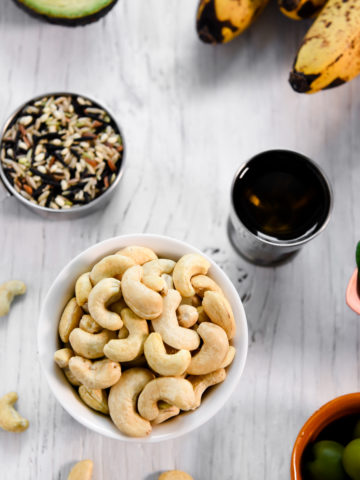The contents of this article are human-created.
This post may contain affiliate links. Please see my full disclosure for details.
Explore the benefits of grounding yourself with food and nature. Reduce anxiety, improve digestion, and promote a healthier nervous system with these simple techniques.

*Nutrition Disclaimer: The information provided on this site is designed for educational purposes only. You should not rely on this information as a substitute for, nor does it replace professional medical advice, diagnosis, or treatment. Please read my disclaimers page for more information.
Trust me, I am no stranger to nerves, fear, overwhelm and overthinking. As an introvert and highly sensitive person (HSP), I have experienced my fair share of anxiety.
Over the years, I have found food and nature to be excellent tools in nervous system regulation and keeping anxiety at bay.
What's the Purpose of Grounding?
Grounding is a way to connect to our bodies and become present in the moment. It can reduce ruminating thoughts, stress, and anxiety.
But, most importantly, it helps regulate the nervous system and stimulates the"rest and digest" or "rest and repair" response, which can lead to a cascade of positive health benefits.
Health Benefits of Grounding
Improves digestion and gut health. Constantly being stressed and anxious inhibits digestion and nutrient absorption. Regularly calming the nervous system can drastically improve digestion and gut health. In fact, most food sensitivities are caused by chronic states of flight, fight, freeze or fawn.
Reduces inflammation. Feelings of stress and anxiety signal an inflammatory response to prepare the body for physical injury. Grounding can signal that it's safe for the body to enter "rest and repair," which can calm inflammatory conditions such as chronic pain and skin eruptions.
Boosts energy and improves focus. Fatigue, apathy, brain fog and the inability to focus can be common symptoms of chronic flight, fight or freeze responses. Grounding is a great way to reset the nervous system, naturally boost energy levels and improve focus.
Improves Mental Well-Being. Grounding is a great way for anyone to improve their overall mental well-being. However, I can attest that it also has positive effects on anxiety, depression, grief and the aftereffects of complex trauma.
How to Ground Yourself with Food
Consume whole foods. Processed foods are full of sugars, artificial dyes, too much salt, and many other highly stimulating ingredients. Eating a diet primarily consisting of whole foods is one of the best ways to reduce the load on our nervous systems, lower anxiety, and improve overall mental well-being.
Eat balanced meals. Protein, fibre (complex carbohydrates), and healthy fats are part of a well-rounded diet for a reason. Among many other roles, they are needed for cell repair, gut health, mood regulation, and (of course) proper nervous system function.
Avoid refined sugars. Natural sugars are much less stimulating than those that are heavily processed and refined. Natural sweeteners like honey, maple syrup and coconut sugars contribute to a slower spike in blood sugar which can also reduce spikes in anxiety.
The act of cooking is a great way to get out of your mind and into your body. From the physical preparation to the aromas, tastes and textures, cooking provides sensory stimulation that can bring us into the present moment with a heart full of gratitude.
Eat without distractions. Sitting down to eat without screens, texting, or scrolling through social media is a simple yet powerful way to ground into our bodies and the present moment. It can also improve digestion since the mere sight and smell of food can tip off the digestion process, much like taking the time to thoroughly taste and chew our food.

Grounding Foods to Include in Your Diet
Root vegetables are a great source of grounding power. Most are solid and heavy in nature, nutrient-dense, and calorie-rich, contributing to their downward-flowing and rooting energy. Their fibrous nature also makes them great for gut health, which in turn, can boost mood and reduce anxiety.
Grains and pulses are another excellent food for grounding. They are rich in calories, carbohydrates, and amino acids, all of which offer sustenance and hearty comfort.
Nuts and seeds are full of healthy fats, fibre and protein, the three main nutrients in nourishing the nervous system and overall health.
Dark leafy greens are rich in minerals, B vitamins, vitamin C and other key nutrients for stress and mood regulation.
Mineral Salts (such as Himalayan, Celtic or Sea salt) are rich in naturally occurring minerals that play a crucial role in regulating our stress response.
Naturally red foods (such as beets) can nourish the root chakra (or first energy centre). When in balance, this energy centre is responsible for making us feel safely rooted in ourselves and in the world.
Quality Meats (such as game meat, wild-caught fish, pasture-raised poultry, grass-fed and finished beef or bison) are the most easily digestible sources of protein, heme iron and vitamin B12, all of which are needed for optimal physical health, mental health and proper nervous system function.
Hearty soups and stews are comforting, warming and full of grounding nutrients. Nothing signals safety to the body like sitting down to a dish of your favourite comfort food.
Slow-cooked and slow-roasted foods also provide that same warming, downward-moving yin energy that can activate the "rest and digest" response.
My Favourite Grounding Recipes
- Creamy Beetroot Soup
- Cinnamon Balsamic Glazed Beets
- Almond Flour Chocolate Chip Cookies
- Almond Flour Flatbread
- Sweet Potato Corn Chowder
- Savoury Sweet Potato Muffins
How to Ground Yourself with Nature
Earthing (walking and standing barefoot on grass, sand, or mud) provides a direct connection to the earth. Much like how a grounding rod works, the earth pulls (harmful) positively charged ions while recharging us with (healing) negative ions. Earthing regularly can stimulate a cascade of health benefits. Some of these include preventing cell and tissue damage, lowering inflammation, improving blood flow and more.

Exposure to unfiltered sunlight is crucial for vitamin D production, which is required for mood and sleep regulation. On the same note, reducing exposure to artificial blue light can improve sleep, mood and the ability to feel relaxed.
Nature walks and hiking are excellent ways to ground. From the purified oxygen to the natural sunlight, spending time in nature is incredibly healing, both physically and mentally.
Swimming in the ocean, hiking through dense forests, up mountains or near waterfalls is a great way to recharge with health-promoting negative ions.
Gardening is such a wonderful grounding technique. Much like cooking, it can be a meditative practice for many. It's also similar to earthing. The smell and touch of dirt floods our bodies with negative ions, as well as microbes that contain antidepressant properties.
Indoor Plants can be a great way to bring the benefits of nature and gardening indoors. They can purify the air in our homes and workplaces while providing the same benefits as gardening when repotting and tending to their needs.
Animals (especially dogs) are fantastic coregulators. This means our nervous systems can sync up with theirs, reducing heart rate and stimulating the "rest and repair" response. Not to mention, just as with fellow humans, bonding with animal companions releases the health-promoting hormone oxytocin, which has many benefits for physical and mental well-being.
Extra Tips
Movement and exercise is another excellent way to get out of your head and into your body. Even just walking, dancing or stretching gets the blood flowing, stimulating the body-brain connection. Certain types of movement, such as restorative yoga, are specifically designed to stimulate the "rest and repair" response. These can be especially beneficial when you need to ground.
Breath is another great grounding tool that is naturally available to us. Deep belly breaths stimulate the vagus nerve, which resets the nervous system and activates the "rest and repair" response. However, some breathing techniques can actually stimulate the release of cortisol (which isn't helpful when you're anxious state). Ensuring your exhale is longer than your inhale will trigger the heart rate to slow and the nervous system to enter "rest and digest."
Tech-free time is becoming increasingly important for overall health. From Wi-Fi and Bluetooth to TVs, computers, and cellphones, we are bombarded with EMFs, radiation, and positively charged electrons. Taking time to unplug is a great way to reset the nervous system and recharge with negative ions.
Reduce social media consumption. It's no secret that when it comes to anxiety and mental health, social media does more harm than good. For me, reducing social media use (specifically Instagram) has been like night and day. My anxiety, self-worth and ability to stay focused and present on what matters most to me has drastically improved.
A Word of Encouragement
If you're feeling particularly overwhelmed with the pressures of our modern world, know that you are not alone. Especially when spending any amount of time online, it can feel as though the whole world is spinning out of control. Just know that you don't have to keep up with it all. It's okay to take solace in the slowness nature has to offer. It's okay to take time to retreat inward. It's okay to simply be.





Rate this Recipe & Share How it Turned Out!